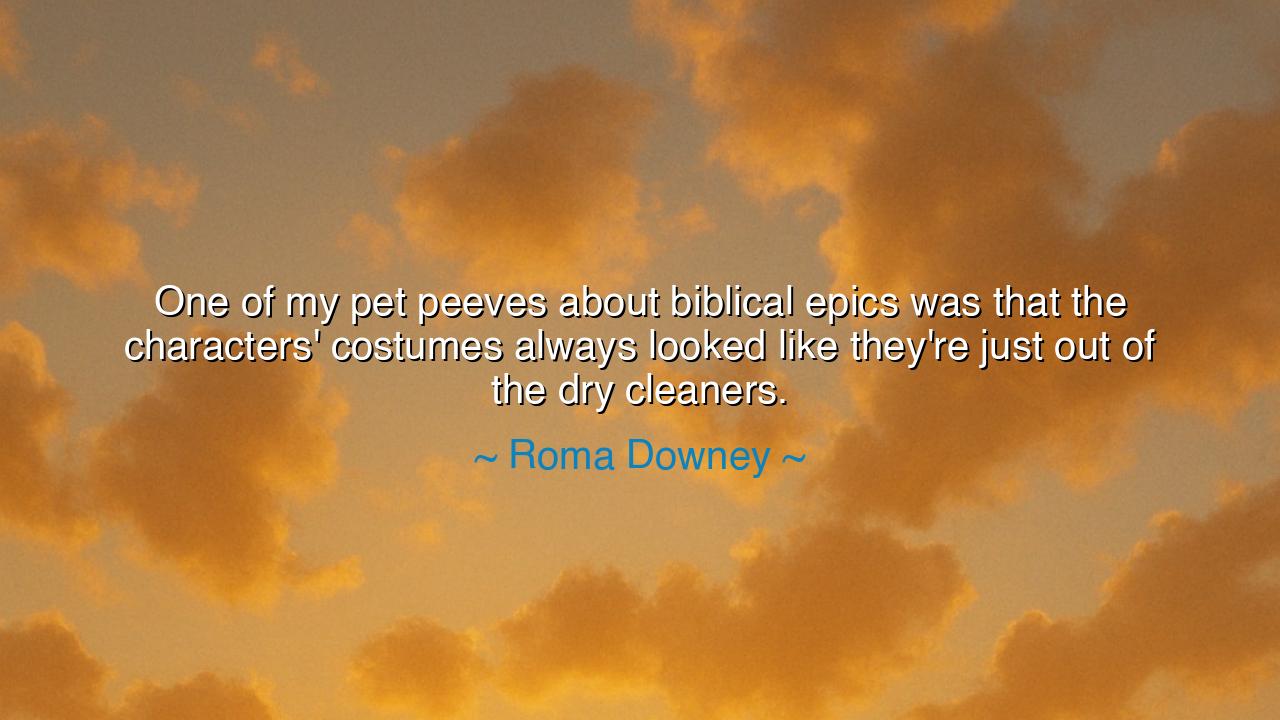
One of my pet peeves about biblical epics was that the
One of my pet peeves about biblical epics was that the characters' costumes always looked like they're just out of the dry cleaners.






In the words of Roma Downey: “One of my pet peeves about biblical epics was that the characters' costumes always looked like they're just out of the dry cleaners.” At first, this statement may seem lighthearted, even trivial, a small critique of film production. Yet beneath its humor lies a truth as sharp as a blade: the danger of stripping authenticity from the telling of sacred stories. For when garments meant to carry the dust of deserts appear spotless and pressed, the struggle of ancient lives is hidden, and the power of truth is weakened.
The origin of Downey’s words comes from the long tradition of biblical films in Hollywood. For decades, epics portrayed prophets, kings, and apostles in garments more suited to a stage than a wilderness. Such portrayals may have dazzled the eye but they diminished the soul of the story. The ancients whose lives these films depict walked through hardship, bore the sweat of labor, and carried the grime of battle and exile. To clothe them in perfect robes is to forget that holiness often dwells amid dust and imperfection, not in polish and display.
This is not merely about film—it is about the truth of representation. When stories are cleansed of their grit, they lose the weight that gives them power. The Bible is not a tale of spotless robes but of wandering tribes, exiled peoples, shepherds in fields, fishermen at sea, and prophets clothed in sackcloth. Their greatness came not from appearing immaculate, but from enduring suffering, rising from the dirt, and carrying the mark of their struggles. Downey’s frustration reveals a desire to honor that truth, to let the stories breathe with the realism they deserve.
History provides its own warnings. When ancient Rome sought to glorify its emperors, it sculpted them in marble perfection, erasing their scars and blemishes. Yet the people knew the truth: these men had faltered, had failed, had grown old. The statues became lies carved in stone, monuments to illusion rather than authenticity. In the same way, when we demand spotless costumes for biblical heroes, we risk turning their lives into mere pageantry instead of testimony.
The meaning, then, is profound: authenticity matters more than polish. To depict the lives of the ancients in their true form—the dirt on their sandals, the wrinkles in their robes, the sweat on their brows—is to honor the struggles that made their faith heroic. To present them as flawless is to rob their stories of power, for the audience no longer sees themselves reflected in those characters. Only when we see that prophets and apostles were human, clothed in dust and toil like ourselves, can we draw strength from their journeys.
The lesson for us is clear: in all things, choose truth over appearance. Whether in art, in work, or in life itself, do not hide the marks of struggle. Do not be ashamed of the dust upon your clothing or the scars upon your heart. They are signs that you have lived, labored, and endured. When telling stories, whether of history or of your own life, do not polish away reality to impress others. Speak with honesty, for authenticity inspires far more deeply than perfection ever could.
In practice, this means embracing imperfection. If you are an artist, let your work carry the rawness of life. If you are a leader, admit your flaws as well as your triumphs. If you are a storyteller, let the characters breathe with humanity, not with artificial gloss. For in the end, as Roma Downey reminds us, truth is not spotless—it is real, and therefore, it is powerful. Let us, then, pass this wisdom to the generations: that the greatest epics are not those told with clean robes, but those told with honesty, humility, and the dust of lived experience.






AAdministratorAdministrator
Welcome, honored guests. Please leave a comment, we will respond soon